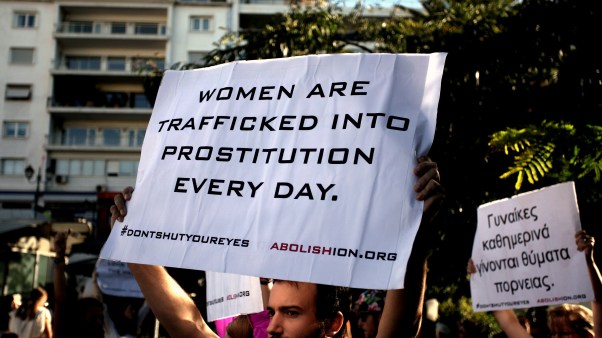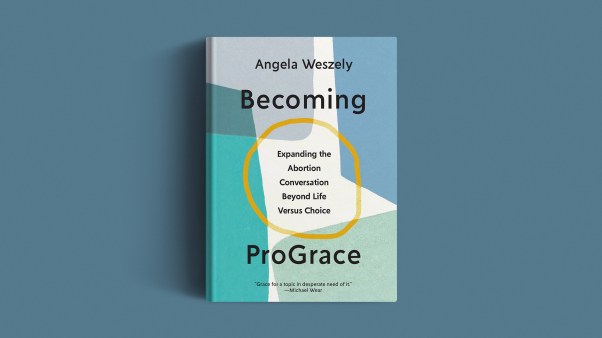Earlier this year, CHRISTIANITY TODAY asked a random sample of readers to rate the importance to them of a series of religious and theological questions. The editors were surprised by the results: Higher than the problem of pain, and more important than the charismatic renewal—indeed highest of all, these readers rated “Should Christians take their Lord’s Day observance more seriously?”
The results of this survey have guided the editors in commissioning chapters for a book to be published jointly early in 1989 by CHRISTIANITY TODAY and Scripture Press. Here, as a foretaste of things to come, is Pastor Eugene Peterson’s answer to our readers’ number one question.
I got onto it early, and engaged in my sin with gusto. As I developed in the Christian faith, I was examined and instructed in ways to discern, repent of, and defend against the classic sins that interfered with faith and love and hope. When I became a pastor, I was subject to even more rigorous examination. But not once did anyone call me on this sin. Instead, I was—if you can believe it—commended in my law-breaking. In fact, at one critical point in my life, when I was out-of-control obsessive in my indulgence of this sin, I was rewarded with the largest single annual increase in salary I have ever received.
It is the American bargain-basement sin, on sale in virtually every American church. The sin? Sabbath breaking, the willful violation of the fourth commandment.
I saw this sin rampant in others long before I saw it in myself. And what I saw was not attractive: an entire culture living on the edge of panic. A mind-boggling technology that could do almost anything in and with space, but fidgety, nervous, and spastic with time. I saw the people around me work masterfully with computers, organizations, and electronic equipment, but when presented with an unplanned or undefined ten minutes, or hour, or day, suddenly overtaken with the Saint Vitus’ Dance. Can’t stand still. Can’t be still. There was the refusal to be still and be silent. The refusal to look and listen. The refusal that then becomes an inability to stop and rest and behold what is “very good” in the creation and in the Cross.
Is God doing anything in this world? Is God saying anything to this people? Who knows? If anyone is going to know, it will require some first-class looking and listening, the kind of first-class looking and listening that Sabbath keeping nurtures, and matures.
Sloth And Sabbath Breaking
The source sin behind Sabbath breaking is sloth. But isn’t sloth doing nothing at all? No, it is just doing nothing of what we are created to do as beings made in the image of God and saved by the Cross of Christ. Sloth is laziness at the center, while the periphery is adazzle with a torrent of activity and talk. Laziness, the seventh of the deadly sins, is the refusal to do our real work—deal with God, deal with ourselves. It is the sin that unobtrusively avoids Creator-attentiveness and creature-awareness, and then noisily and busily diverts attention from the great avoidance with a smoke screen of activity.
Christians are in the vanguard of this sin and escape detection even more successfully than non-Christians because they label this sloth-originating hyperactivity with euphemisms: “ministry,” “witness,” “the Lord’s work.” They pretend to keep a Sabbath by Sunday churchgoing, and then stuff the day with meetings, responsibilities, committees, and concerns until it looks (and feels) tight as a German sausage. Pastors are usually in charge of the stuffing.
I looked at this sloth-activated Sabbath breaking and was staggered by the ruinous effects in the culture, in the church, and in myself. The incredible shoddiness in personal relationships that characterizes our culture is more than anything else a consequence of sins against time—for intimacy requires time, affection requires time. Without time neither the best of intentions nor the highest standard of living penetrates the human relationships by which we realize our dignity and our worth. And the outrageous adolescence in religion that is the scandal of our churches is, more than anything else, a consequence of sins against time—for maturity requires time, worship requires time.
Doing anything about the sloth in American culture seemed beyond me, and in church culture even more so. But I thought I might do something about myself.
A Monday Sabbath
I started by keeping a Sabbath myself. Sunday is a work day for me, and so unavailable for a Sabbath. I decided to keep a Monday Sabbath. My wife joined me in the observance. We agreed that it would be a true Sabbath, and not a “day off.” We didn’t have much to follow in the way of precedents since few of the Christians and none of the pastors of our acquaintance kept a Sabbath, but we knew that it must be a day for praying and playing, the two elements we noticed were woven in and out of all the healthy biblical, Jewish, and Christian observances.
We knew we needed a place and a routine (a sanctuary and a ritual) to support our practice. We chose to use the forest trails for our sanctuary and devised a simple ritual of silence for the morning hours; we break the silence over lunch with audible prayers and are free to converse through the afternoon and evening. We birdwatch, smell flowers, pray the psalms, feel the weather, reflect, listen, look. We keep these Monday Sabbaths in all kinds of weather and whether we feel like it or not, intending to be as diligent in our Sabbath keeping as we want our parishioners to be in theirs. No other single thing that we have ever done comes close to being as creative and deepening in our marriage, in our ministry, and in our faith.
The Leisure Of Contemplation
I began to want this for my congregation, too. I saw them mostly as victims of a culture that had been subverted by “angel of light” tactics without anyone even noticing, for they genuinely supposed their Sabbath breaking to be virtuous and were habituated to pastoral commendation for their sloth. I wanted to recover, if possible, the vast leisure of contemplation, recover the Sabbath margins to the week that would allow for joy and dignity.
I was not in a position to impose a common observance, and I did not want even to hint at a guilt-trap legalism. I knew how long it had taken me to recognize the actual virulence in the virtue-appearing charades of my own sloth, and how difficult it is to stand against the pressures of the culture. I determined to provide a worship that was centered, surrounded, and rooted in prayer—not a day for recruitment, or entertainment, or for launching projects. I tried to keep Sundays free for them, free from church business and free for worship; free from my work and free for their leisure. I knew this would take a long time and could only be realized incrementally. After several years of this behind-the-scenes “not doing,” I came out in the open with a letter to the congregation: “Why Your Pastor Wants You to Keep a Sabbath.”
A Pastoral Letter
“One day a week I stand before you and call you to worship God. The conviction behind the act is that time is holy. But how often do you hear anyone say so? More likely you hear, ‘Time is money.’ And, as with money, you mostly feel that you don’t have enough of it, ever. On occasion, when you have time for which nothing is scheduled you will ‘kill time.’
“Odd, isn’t it? We have more leisure hours per person per year as a country than anyone could have guessed a hundred years ago. But we are not leisurely. We are not relaxed. We are anxious. We are in a hurry. The anxiety and the hurry ruin intimacy and sabotage our best intentions in faith, hope, and love—the three actions in which most of us set out to do our best.
“That is why I as your pastor want you to keep a Sabbath. I want you to live well. I want you to live whole and mature, with appreciation and pleasure, experiencing the heights and depths of God’s glory in your bodies and your work, your friends and your gardens, your minds and your emotions, at the ocean and in the mountains. You can’t do that if you are ‘on the run.’ You can’t do that if you are watching the clock.
“Sabbath is the biblical tool for protecting time against desecration. It is the rhythmic setting apart of one day each week for praying and playing—the two activities for which we don’t get paid, but which are necessary for a blessed life. A blessed life is what we are biblically promised. A blessed life is not a mere survival life, but a bountiful life. Praying and playing are warp and woof in the bounty.
“Keeping a Sabbath is simple and easy: We pray and we play, two things we were pretty good at as children, and can always pick up again with a little encouragement and if we can only find the time. But we don’t have to find the time, it is given to us. A day a week. A Sabbath. A day to pray and play. God’s gift.
“Christian practice orients the first element of the day around the act of worship—praying. This is the great act of freedom in relation to heaven. This is the exercise of our bodies and minds in acts of adoration and commitment, supplication and praise, ventures of forgiving and giving. We explore, enjoy, and share it in our assembly for worship. For most of you this praying will start out in our sanctuary each Sunday when I call you to worship God. Simple.
“The second element of the day is for playing. This is the great act of freedom in relation to earth. We exercise our bodies and minds in games and walks, in amusement and reading, in visiting and picnicking, in puttering and writing. We take in the colors and shapes, the sounds and smells. We let the creativity of the creation nudge us into creativity. We surprise ourselves by creating a meal, or a conversation, or an appreciation, or some laughter that wasn’t in our job description. We have some fun. Easy.
“So—if it is so simple and easy, why do we find it so hard? Because the world is in a conspiracy to steal our Sabbath. It is a pickpocket kind of theft (nothing like an armed robbery) and we aren’t aware of it until long after its occurrence. The ‘world’ is sometimes our friends, sometimes our families, sometimes our employers—they want us to work for them, not waste time with God, not be our original selves. If the world can get rid of Sabbath, it has us to itself. What it does with us when it gets us is not very attractive: after a few years of Sabbath breaking we are passive consumers of expensive trash, and anxious hurriers after fantasy pleasures. We lose our God and our dignity at about the same time.
“That is why I want you to keep a Sabbath. Guard the day. Protect the leisure for praying and playing.”
Coral In The Chaos
I didn’t expect a rush of compliance in response to the letter; nor was I disappointed. But here and there, now and then, individuals, and sometimes families, venture into the practice of Sabbath keeping and work out ways to participate in the sanctification of time in the particular circumstances of their own temperaments and routines, jobs and schedules.
The conviction behind Sabbath is that time is holy. But how often do you hear anyone say so? More likely you hear, “Time is money.” And, as with money, you mostly feel that you don t have enough of it, ever.
Sabbath keeping, at least in our American culture, cannot (must not!) be imposed. It can only be realized by the person of faith who is caught by a sense of reverence and grace inherent in time and wills to honor it in rhythmic faithfulness through a lifetime of weeks, following the counsel of Jesus who told us that we were not made for the Sabbath, but the Sabbath for us (Mark 2:27).
I have in my imagination a picture of coral formations in an ocean, gradually but surely growing, eventually accreting into an island that emerges out of the watery chaos, a safe place for the shipwrecked to land. These Sabbath islands appear from time to time, from place to place, the consequence of praying-playing Christians who mock the noisy pretensions of the world’s winds and waves by attending to God, and to themselves before God. Each Sabbath, act is a grain that adheres to another, Sabbath to Sabbath, and, unlikely as it seems, through a process of organic accretion, lifts a time island above the fretful seas. These islands in ages past became continents, and could become so again.
But I must post a warning here: This is incredibly perilous, this Sabbath keeping. Keeping the Lord’s Day holy is as dangerous to soul and spirit as driving an automobile at high speeds is to life and limb. For every Christian who experiences this day as redolent with freedom and sunny with grace, there seem to be a dozen who tell stories of childhood Sundays corseted with whalebone prohibitions. It is too little noticed and remarked upon that among the numerous and solemn commands in Scripture to keep the Sabbath are some extraordinarily fierce condemnations of those who did keep it in such a way that was ruinous to them and everyone around them.
Isaiah, with angry sarcasm, calls Sabbath keeping the “trampling” of God’s courts (Isa. 1:12–14). Hosea (2:11); Amos (8:5), and Jeremiah (chapter 7) are equally strident in their denunciations of Sabbath keepers. Jesus received more hostile criticism from Sabbath keepers than from any other single class of people. Paul was irritably impatient with the people who were insistent on a recovery of Sabbath keeping (see Rom. 14:5–9 and Gal. 4:8–10).
Clearly, every Christian who agrees to keep a Sabbath enters high-risk territory. But Sabbath keeping is no more dangerous than the practice of marriage, or the rearing of children, or the worship of God. Whenever we are working at the optimum of our powers as human beings, the temptations to evil are also at their heights.
The surest way to keep Sabbath keeping honest and holy is to return the practice continually to its biblical reasons. In its basic form the Sabbath command is given twice, first in Exodus, then in Deuteronomy, but each time with a different reason. The Exodus reason is that God rested the seventh day, marking it with blessing and holiness. Sabbath keeping gets us into step with the rhythm of the Creator. It is a day for praying (Exod. 20:8–11).
The Deuteronomy reason is that the people had been saved from Egyptian slavery, 400 years without a day off. Sabbath keeping gets us into step with the rhythm of the Savior. It is social justice, the gracious relief from the oppression of sin. It is a day for playing (Deut. 5:12–15).
How we keep the day is not biblically prescribed. That we keep the day is commanded. By giving us clear reasons foundational to Sabbath keeping, and by not giving instructions on how to implement them in our situation, has not our Lord the Spirit dignified us with creativity and initiative? He trusts us to work out practices of prayer and play that honor and participate in holiness. Should we not be equally trusting of each other, and diligently refrain from imposing methods of Sabbath keeping? There is scope for endless creativity here when we encourage a return to the source reasons of praying and playing.
Praying is the action by which we attend to God, stretching out in daring acts of intimacy beyond ourselves, risking ourselves in meetings on holy ground. Praying is the instinctive act of responding to our Creator, of pleading to our Savior, of praising our Provider. Everyone does it: children and adults, the primitive tribes and civilized nations, paleolithic hunters and space-age astronauts. From time to time people quit doing it. Gradually life flattens into two-dimensional predictability.
Playing is the action by which we explore our humanity, experimenting with the movements of our body, discovering and testing limits, entering into the swift and kaleidoscopic energies of other persons in combinations of opposition and cooperation, heightening the interplay of space and time in their multiple diversities. Playing extends the range of human experience, and in the process we find that we like being human—play exhilarates, gives pleasure. Nearly everyone does it. But not all the time. And some people withdraw from the game entirely. When they do, the people around them feel diminished, feel that there is less humanity in the room.
It is too little noticed that among the solemn scriptural commands to keep the Sabbath are some extraordinarily fierce condemnations of those who did keep it in such a way that was ruinous to them and everyone around them.
Good Sabbath Keeping
Both playing and praying, praying and playing, are essential for good Sabbath keeping. A Sabbath that omits one or the other is not a true Sabbath. But it is difficult to integrate them. Our commonest experience is with their separation. In America we have conspicuous examples of widespread observance of half-Sabbaths, prayerful Sabbaths without any play, and playful Sabbaths without any prayer. Our Puritan ancestors practiced the first; our pagan contemporaries practice the second.
The Puritan America of 200 years ago was good at Lord’s Day prayer, but gave play short shrift. The Puritans were on a serious expedition, intent as they were on establishing the “city on the hill.” Prayer and work were the yoked oxen of their enterprise. Prayer came to have less and less to do with adoring God, and became more and more utilitarian—a supernatural assist to making a profit. Tragically, and un-biblically, they left out, and in some instances actually banned, play. It did wonders for the economy, but blighted the human spirit into a dutiful but cheerless religion.
The pagan America of today is good at Lord’s Day play, but is anemic in prayer. The revival of pagan enthusiasm for the body fills sports stadiums and crowds recreation areas with persons on a religious quest for fun. The occasional prayers offered are on the model of ritual incantations supplicating the Greek fates for a favorable breeze. By trivializing prayer, their lives are trivialized and the play that they had expected to give them pleasure leaves them greedy, anxious, and fatigued. Such play, instead of venturing an exploratory celebration of being human, becomes an escape from the human and dehumanizes the players.
Christians serious about the redemption of a Devilharrassed society and advertising our Lord’s invitation to “all who labor and are heavy laden” (Matt. 11:29) can hardly begin better than by enacting with their lives Sabbaths that carve out time for long and loving looks at Christ and his creatures. This cannot be accomplished by a Panzer assault: bully preaching or blue laws. But as a few Christians in a few churches in a few communities in America keep a Sabbath, pockets of resistance are formed that provide access to leisured and loving time for the people around them, in the same way that national parks preserve access to the beauties of wilderness space. These pockets of hidden holiness preserve our American days and keep each week accessible to creation work and resurrection appearances.
Eugene H. Peterson is pastor of Christ Our King Presbyterian Church in Bel Air, Maryland. His latest book is Reversed Thunder: The Revelation of John and the Praying Imagination.










